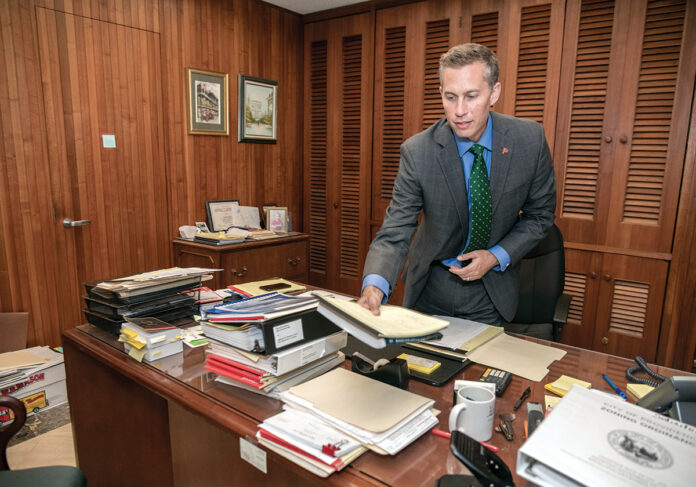No one likes to pay property taxes. In Providence, fighting that annual bill has become almost routine for many large commercial property owners when millions of dollars in tax revenue are at stake.
Tax challenges represent almost 20% of the active civil cases involving the city, according to an annual summary from City Solicitor Jeffrey Dana. His office represents the city tax assessor, who sets the values for each property.
In his most recent annual tally, Dana reported to the City Council that Providence has 845 open civil cases in either state or federal court. Of those, 155 are seeking relief from taxes.
Most of the active tax cases involve commercial properties, where the values are high and may justify extended litigation. And the process almost guarantees extensive litigation, because every time the city revalues properties, that contested value is set for three years.
But because the Superior Court requires a lawsuit to be filed every year to preserve the property owner’s rights, one assessment decision can result in three consecutive lawsuits.
[caption id="attachment_291436" align="alignright" width="300"]
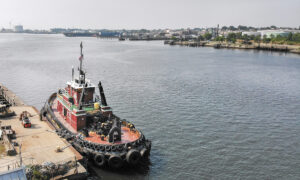
OFF COURSE? McAllister Towing of Narragansett Bay LLC has taken Providence to court over its ability to tax as tangible property the company’s tugboats, which the city values at $5 million. In 2014, the first year for which a complaint was available in court records, the tax bill for the fleet was $330,000 based on the city’s valuation. City Solicitor Jeffrey Dana said state law allows cities to tax tangible personal property owned by property owners. “Tugboats are not exempt from taxation.”
/ PBN PHOTO/ARTISTIC IMAGES[/caption]
Responding to questions posed by Providence Business News, Dana said the volume is not surprising, “considering that there are 44,000 taxable parcels and 5,600 tangible tax accounts in the city.”
The number fluctuates, he said, and is typically driven by owners of high-value commercial properties, with multiple years involved.
He rejected the argument often made by taxpayers that the city is overly aggressive in its valuations. “Property values are market driven,” he said. “The city is neither aggressive nor arbitrary in its assessments.”
This year, the list of property owners with active tax appeals in Superior Court and the state Supreme Court includes prominent hotels, industrial properties and international exporters.
The process followed by the aggrieved taxpayers starts in City Hall. The first step is a challenge to the assessor’s office. If the taxpayer is not satisfied, or if the assessor maintains the valuation, the next step is another administrative review – by the Board of Tax Assessment Review.
If this body upholds the assessor’s valuation of a property, the owner can go to court.
Michael “Tim” Eskey, a principal at Moses Ryan Ltd. in Providence, has represented several large commercial owners. The process is onerous, he said, but all along the way, there is a potential for the assessor and property owner to negotiate a settlement.
“And typically, the assessor will engage in some kind of negotiations,” he said. “Or they may take the position, no, we’re right, and go ahead [and file a lawsuit].”
While the tax suits are in play, the bills are supposed to be paid to the city. But a strong weapon in the property owners’ hands is accumulated interest. If the court finds the city was overly aggressive in its assessment, the overpayment has to be returned to the property owner with 12% interest, the amount set by state law. And any settlement or loss by the city in court brings down revenue in a city that annually has budget issues.
That can amount to quite a bit of money if the decision returns a significant sum to the property owner, according to commercial tax attorneys and appraisers.
The threat of that can move the city toward a settlement, particularly if several consecutive years of tax cases are building up. Explained Peter Scotti, owner of Peter M. Scotti & Associates Real Estate in Providence: “If you’ve got a tax appeal case that’s been going on for five, six years, and the city thinks it’s got a loser, they not only have the potential of losing that money, they also have the potential of statutory interest. That can add up. That can be a home run” for the property owner.
In cases that the city determines it may lose, it often settles for tax credits – a reduction in future property taxes, rather than a cash payout from city reserves.
Without a settlement, a judge may split the difference between competing assessments.
NOT SO SIMPLE
One challenge: Appraising is not an exact science. There are three methods to determine the fair market value – comparable sales, project income and cost of construction if the building is new, explained Mark Pogue, a partner at Pierce Atwood LP.
“The objective in any tax appeal is to determine the fair market value of the subject property,” he said. “What makes that task so interesting, but also contentious, is that appraising is an art, not a science. If you have five well-credentialed appraisers looking at the same complicated property, you’re going to get five different estimates of the value of the property.”
How often are commercial property owners challenging their tax bills? It represents about 40-50% of Pogue’s practice. The amount of money at stake can be considerable.
Providence, in particular, has a high property tax rate. It’s currently $36.70 for each $1,000 of value in a commercial property, and $55.80 per $1,000 for tangible, or personal property.
Does it pay to fight the tax bill? Pogue thinks so.
“The fact that I’m so busy with this area of my practice … tells me that taxpayers believe it’s worth it to hire a lawyer to challenge these assessments,” he said.
Scotti makes it clear why: “Every dollar they save on the tax bill is a dollar that goes to the bottom line.”
THE TOP OF THE LIST
These are outstanding appeals of tax assessments in Providence, listed in descending order by property valuation.
[caption id="attachment_291438" align="aligncenter" width="696"]
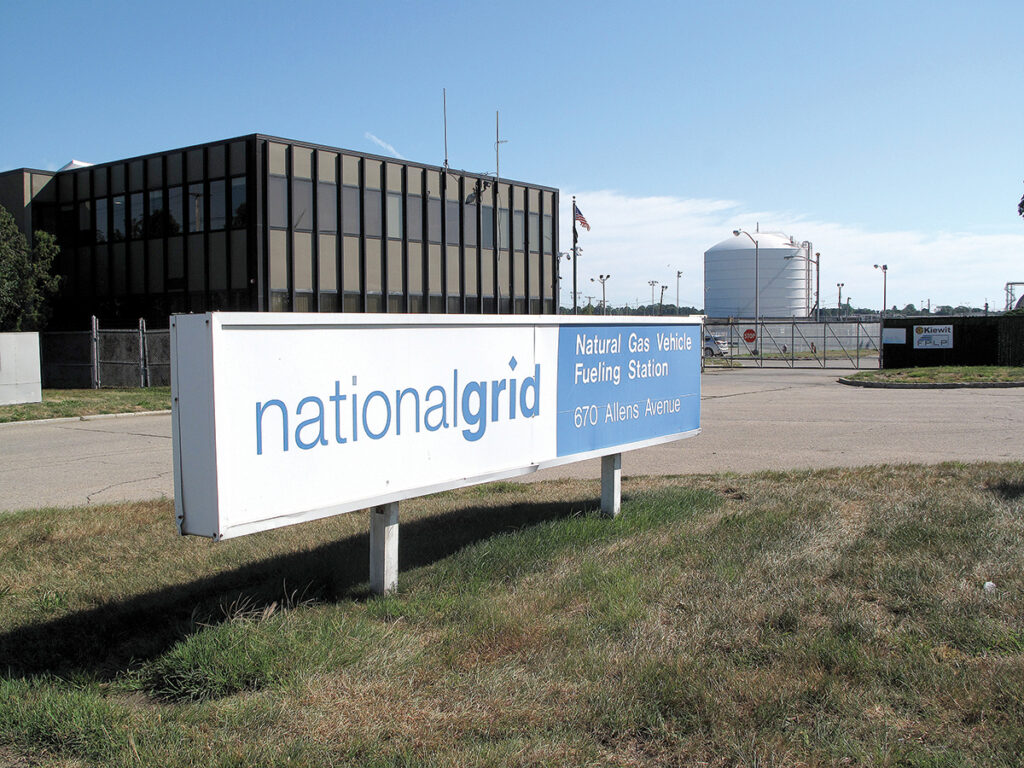
STORAGE YARD: National Grid Rhode Island said Providence has overvalued its property, including its liquid natural gas storage yard on Allens Avenue, above, by about $40 million.
/ PBN PHOTO/MARK S. MURPHY[/caption]
1. National Grid | $553.9 million
The lawsuits filed by Narragansett Electric Co. over its real estate and tangible taxes are at the top of the active challenges list.
One reason may be the challenge of valuing a liquid natural gas storage yard or electrical-grid infrastructure.
The lawsuits cover items that include gas mains and meters, curb valves and regulators, and the liquid natural gas storage yard on Allens Avenue. The suits extend over five consecutive tax years, from 2014 through 2018.
Claiming “excessive and illegal taxes,” the Waltham, Mass.-based corporation, now commonly known as National Grid Rhode Island, says the city has overvalued its property by tens of millions of dollars and is seeking a credit toward future taxes for all affected tax years.
In 2016 alone, National Grid said the property the city valued at $553.9 million was worth $513 million.
National Grid has been represented by Providence-based attorneys Michael Kelly and Thomas Carter. Neither responded to a request for an interview.
In more recent years, the company has continued to challenge its assessments. The most recent lawsuits, which cover tax year 2017, were filed in December. They state the city overvalued the tangible personal property of the company by $14.7 million.
[caption id="attachment_291439" align="aligncenter" width="696"]
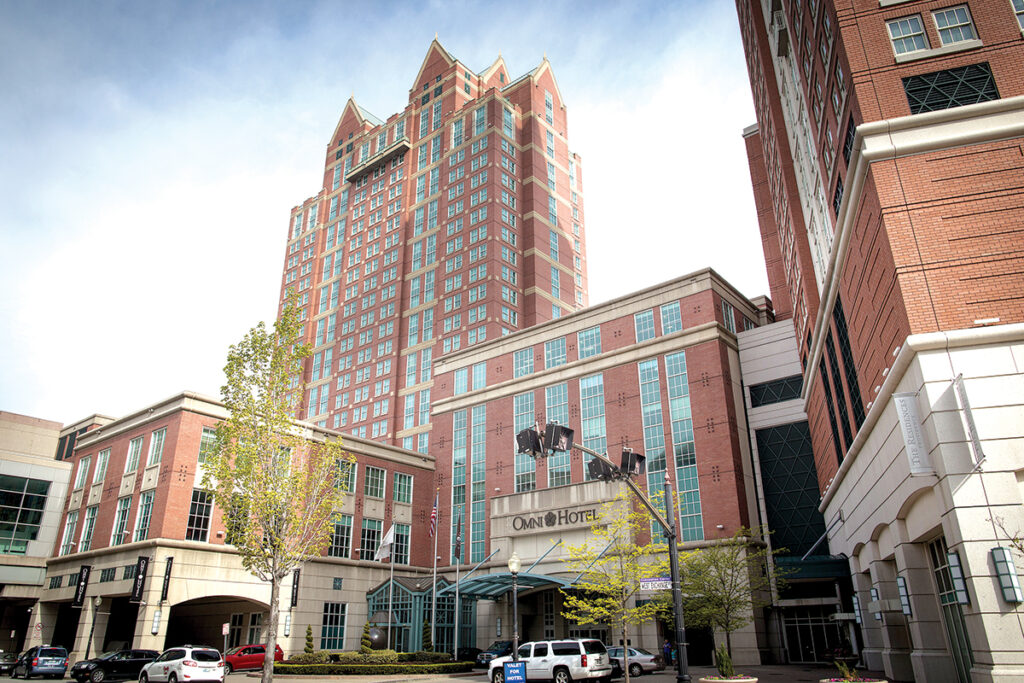
CASES DROPPED: In exchange for dropping cases against one another, in April 2018 Providence agreed to provide tax credits on a quarterly basis for 13 quarters to the owner of the Omni Providence Hotel, plus $550,000 in cash after it was ruled the city overvalued the hotel during tax years 2012-2015.
/ PBN FILE PHOTO/STEPHANIE ALVAREZ EWENS[/caption]
2. Omni Rhode Island LLC | $74.3 million
One of the costliest cases against the city relates to the Omni Providence Hotel.
A series of tax cases, initially filed in 2013, challenged the valuation assigned to the city’s largest hotel and the adjacent land beneath part of the Omni and The Residences, a luxury tower of condominium residences.
According to a complaint filed in 2017 by Pogue, the property taxes applied to the hotel property were “excessive, inequitable, palpably exorbitant and illegal.”
The value of the hotel itself was at the center of the dispute when the cases went to a bench trial that December. Now assessed at $62.4 million, at the time the city had put a value on the hotel of $74.3 million.
Superior Court Associate Justice Richard A. Licht found the city had overvalued the hotel over the tax years 2013 through 2015 and ordered a refund to property owner Omni Rhode Island LLC of $2.4 million, not including court costs and three years of accumulated interest.
The city appealed the decision to the state Supreme Court, but by the spring of 2018 was in settlement discussions with the company.
In April 2018, the Omni and city agreed that in exchange for dropping the cases, the city would pay Omni $550,000 in cash, and provide tax credits on a quarterly basis for 13 quarters for a total of $3.3 million. Altogether, the settlement provided the owner of the Omni with $3.9 million.
Its current cases are still active, and cover the most recent tax years, but the city and the property owner are in settlement talks, said Pogue.
[caption id="attachment_291440" align="alignright" width="200"]
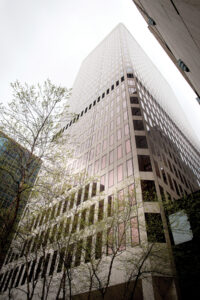
RANDOM FIGURE: According to a lawsuit filed in 2014 by One Financial Holdings, Providence applied a random figure when it assessed One Financial Plaza, above, at $50,693,500 when the city had previously agreed to assess the property at $50 million.
/ PBN FILE PHOTO/STEPHANIE ALVAREZ EWENS[/caption]
3. One Financial Holdings LLC | $50.7 million
Filed in 2014, this case involves a dispute over a negotiated agreement that set the value of the building, commonly known as One Financial Plaza, the former Hospital Trust tower.
According to the lawsuit, to resolve a 2013 tax appeal relating to the property, the city through the assessor agreed with the property owner that the building should be assessed at $50 million for the 2013 through 2015 tax years.
The city honored the agreement in 2013, according to Eskey, who represented the property owner.
But when it sent out the tax bill the following year, the city had entered a value of $50,693,500, he said.
The lawsuit states the city applied a random figure instead. “It never made any sense to me,” Eskey said.
4. Athena Providence Place LLC | $24.4 million
In this case, appealed in July by the city to the R.I. Supreme Court, the value of a 330-unit residential condominium complex is in dispute.
In a Superior Court decision rendered in April, Licht found the city had arbitrarily revalued the property, known as The 903, when it conducted a new property assessment in 2013, one year after a citywide revaluation that hiked condo values at the property by about 30%.
The city had argued that it was appropriate to conduct a specific revaluation of the condominium property because a 10-year tax-stabilization agreement had expired that year.
Licht ruled against it, stating: “The city justified its actions by contending there was a change of condition … even if there was, there is no statutory basis to support revaluation for that reason.”
Eskey represented Athena Providence Place LLC, an entity that owned about two-thirds of the condominiums at that time, he said.
In this case, Eskey said, the 2012 assessment that provided new values for the condominiums should have been continued for the next three years. “What was arbitrary was the fact that there was no change in the property itself,” he said.
According to city records, the property was sold to Athena Providence Place in April 2011 for $24.4 million.
[caption id="attachment_291441" align="aligncenter" width="696"]
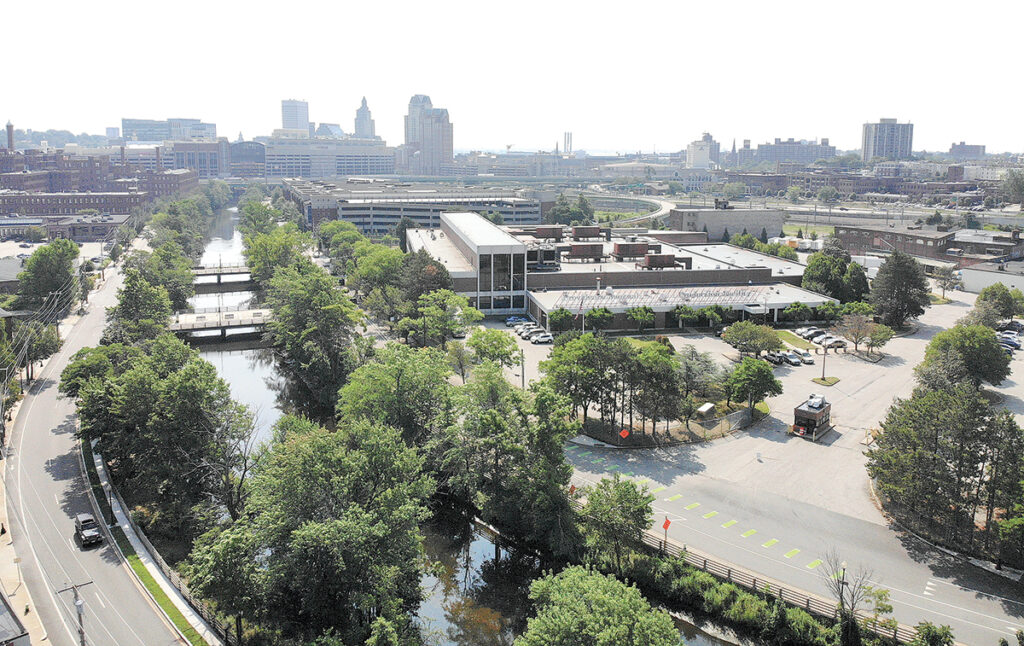
CHALLENGING ASSESSMENTS: The Providence Journal Co. has challenged city assessments on two of its properties: its office building at 75 Fountain St., which it owned until June 2015, and its production facility, above, at 204 Kinsley Ave., which it owned through September 2014 and owed taxes on in 2015.
/ PBN PHOTO/ARTISTIC IMAGES[/caption]
5. Providence Journal Co. | $18.5 million
Like many other property owners, The Providence Journal Co. has challenged its assessments. The city has active tax cases relating to the tax years 2012 through 2015, according to court files.
The challenges relate to two newspaper properties: the office building, at 75 Fountain St., owned by the company until June 2015, and the production facility, at 204 Kinsley Ave., which it owned through September 2014, for which it owed taxes in 2015.
Through attorney Eskey, the company complained the taxes were in excess of the full and fair cash value of the buildings.
Eskey said the active cases concern whether the city had properly accounted for the depreciation of the buildings.
In 2012, when the city had valued the office building at $13.8 million, the company said it was worth $8.1 million. That year, the company said the production building was worth $3.5 million, while the city put the value at $4.7 million.
In the following years, which remain in dispute, the divide was similar.
The production building, now owned by LMG Rhode Island Holdings Inc., is valued at $5.2 million this year. The office building, sold and redeveloped into a multitenant office building, is now worth $13.3 million, according to city records.
[caption id="attachment_291442" align="aligncenter" width="696"]
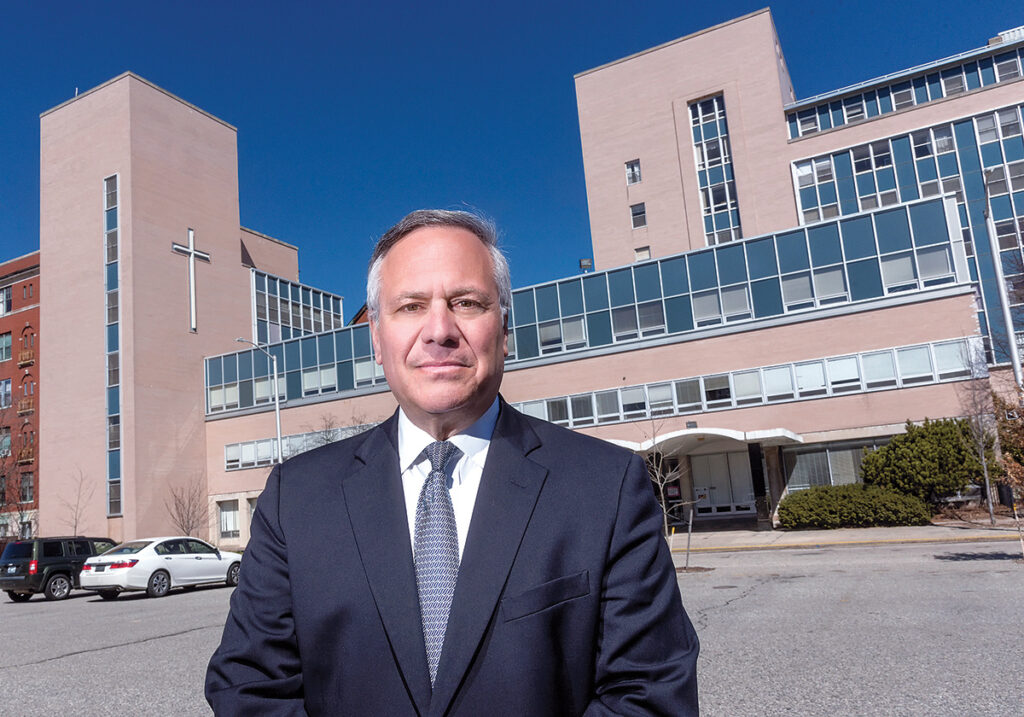
DISPUTE: Former Providence Mayor Joseph A. Paolino Jr. stands in front of the former St. Joseph’s Hospital. Paolino is listed as the registered agent of both 21 Peace Street LLC and Urban Land Development Co. LLC, which are the corporate owners of the former hospital. A disagreement over whether a tax-stabilization agreement can be lifted with a property sale is at the center of a dispute between Providence and the owners.
/ PBN FILE PHOTO/MICHAEL SALERNO[/caption]
6. St. Joseph’s Hospital and 28 surrounding lots | $11.3 million
A disagreement over whether a tax stabilization agreement can be lifted with a property sale is at the center of a dispute between the city and the corporate owners of the former St. Joseph’s Hospital.
The affected property, which includes the former hospital, as well as 28 surrounding lots, most of them parking areas, was filed in February 2017 by 21 Peace Street LLC and Urban Land Development Co. LLC, both of which list former Providence Mayor Joseph R. Paolino Jr. as the registered agent.
The purchase of the Paolino-associated companies came two years after the city entered into a TSA concerning the property with Prospect CharterCARE LLC, the previous owner and a for-profit company.
Under the tax agreement, the property taxes amount to $2.3 million in the 2017 tax year, $2.4 million in 2018 and $2.5 million in 2019.
The city refuses to assess tax for the property independent of the TSA, according to the lawsuit.
7. Orchard Garage LLC | $8.8 million
This lawsuit concerns the valuation of a parking structure over retail stores at 51 Washington St., commonly known as the Biltmore Garage.
Filed in 2015, the lawsuit states that the property was purchased for $6.1 million, but the tax bill in 2014 was set at $322,253, which put the value of the building at $8.8 million.
8. Univar USA | $8.2 million
The lawsuit filed by the chemical distribution company for properties in the area of the Port of Providence concerns the valuation of facilities at 175 Terminal Road and 5 Harborside Blvd. The lawsuit challenges the 2013 through 2015 tax years.
According to the filing, the city assessed the value of the Terminal Road facility at $1.7 million, and the value of the Harborside Boulevard site at $6.5 million.
9. Mad Realty Associates LLC | $7.8 million
This lawsuit concerns the valuation of 10 residential and/or commercial properties in the Jewelry District downtown and on the East Side.
Filed by four property owners, led by Mad Realty Associates LLC, the lawsuit covers the 2010 through 2012 tax years, as well as 2016.
The properties include seven commercial buildings on Bassett and Clifford streets in the Jewelry District, as well as residential properties at 408 Rochambeau Ave., 25 Balton Road and 420 Blackstone Blvd.
The city put the value of the associated properties at $7.8 million. The owners put the value at more than $5.6 million less.
10. Sprague Operating Resources LLC | $6.2 million
The distributor of liquid asphalt, whose industrial campus is located on Allens Avenue near the Port of Providence, filed a lawsuit against the city in 2015 and then for the next two years, challenging both real estate and tangible property values.
The city that year put the value of the property at $6.2 million, while Sprague argued it was worth $4 million.
According to the filings, Sprague argues its valuation was faulty because it came about as a result of a selective revaluation. Although the city did not conduct a citywide revaluation as of Dec. 31, 2014, several properties at ProvPort were selectively chosen for revaluations, the company’s attorney, Pogue, argued in the original complaint.
The Sprague property covers 19 acres and has a variety of office and storage buildings dating to 1920. The site was singled out in a “selective, spot assessment,” Pogue argued, in his filing.
A property with no value?
[caption id="attachment_291443" align="aligncenter" width="696"]
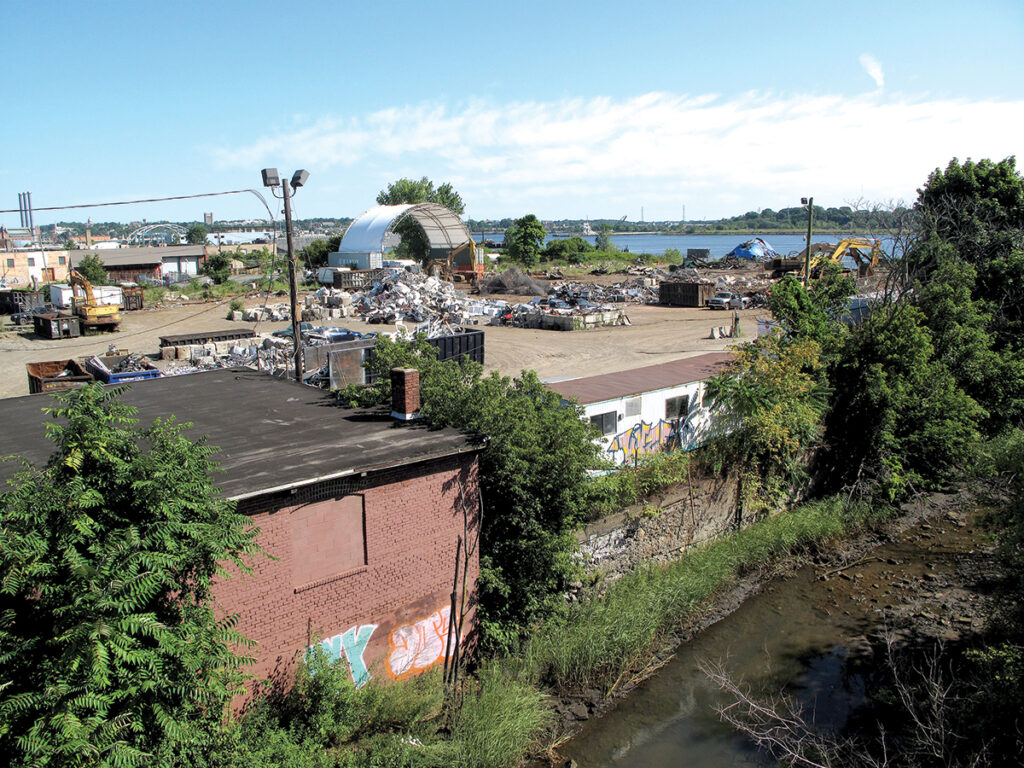
RECYCLED METALS: AARE LLC has filed lawsuits against Providence arguing the city’s 2015 valuation of Rhode Island Recycled Metals, a scrap metal and junk car recycler, is $1.5 million more than the 2014 assessment of $1.3 million.
/ PBN PHOTO/MARK S. MURPHY[/caption]
Rhode Island Recycled Metals | $2.8 million
The scrap metal and junk car recycler located at 434 Allens Ave. has challenged assessments for the tax years 2015-2017.
Filed by the corporate entity AARE LLC, the suits argue that the Providence 2015 valuation is $1.5 million greater than the 2014 assessment of $1.3 million.
In August 2014, the city adopted an ordinance that prevented mixed-use development in the waterfront district, Mark Russo, the attorney for the company stated, in his filing. That restriction of the district to water-based uses, however, did not come with corresponding infrastructure improvements, he noted, making the site unusable as a port. And the environmental liabilities associated with the property are not reflected in the assessment.
He put the value of the property at $0.
Editor's note: This story has been updated to reflect that the active cases by The Providence Journal Co. against the city concern whether the city had properly accounted for the depreciation of its buildings.
Mary MacDonald is a PBN staff writer. Contact her at Macdonald@PBN.com.